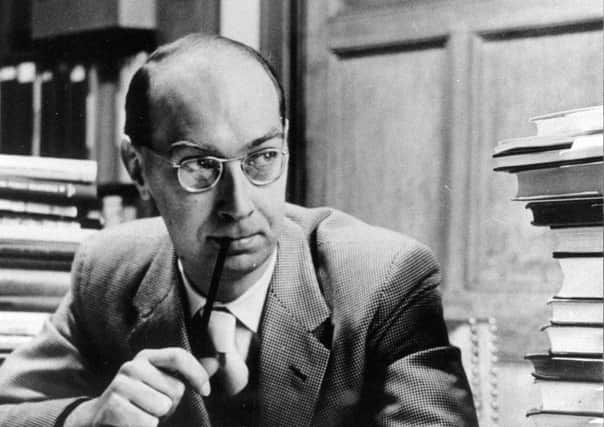Philip Larkin: Poet remembered 30 years on


WITH his thick-rimmed spectacles and receding hairline, Philip Larkin did at times resemble a glum-looking Eric Morecambe.
There was something awkwardly self-conscious about his gangly appearance that seemed at odds with the smooth, striking lines of his poems.
Advertisement
Hide AdAdvertisement
Hide AdIt’s now 30 years since Larkin died in a hospital bed in Hull and despite the salacious and sometimes controversial details about his life that have emerged from letters and biographies in the intervening decades, including accusations of bigotry and a penchant for pornography, his popularity with the reading public hasn’t waned.


There’s a reason why he was voted Britain’s best-loved poet in a Poetry Book Society survey in 2003. Larkin tackled the big issues in life - he wrote about life, love, sex and death and he did so in a way that ordinary people could relate to, which explains why he remains one of the most frequently quoted poets.
His popularity has been seized upon by Hull - the city where he lived for the last 30 years of his life - and in 2010 a statue of him was unveiled on the concourse of the city’s railway station.
It was the culmination of a series of events to commemorate the 25th anniversary of his death - including a trail of 40 giant fibreglass toads, a homage to one of his best known poems, dotted around the city and the streets of East Yorkshire where he once walked.
Advertisement
Hide AdAdvertisement
Hide AdThe 10-week display generated more than £1m for Hull according to a report published this year and brought 120,000 visitors to the city to follow the trail.
Larkin’s association with Hull began 60 years ago. He arrived in the spring of 1955 - the same year that his third volume of poetry, The Less Deceived, was published - to take up the post of librarian at the university.
The popular perception of Larkin is that of a solitary, curmudgeonly figure. It’s an image seemingly born out by Roger McGough who was a student at Hull University when Larkin was working there.
In his 2005 memoir Said and Done, McGough describes him with nimble dexterity. “There was the merest hint of celebrity about him, in the sense that he was probably the only member of staff who was known to the general public outside the East Riding.....
Advertisement
Hide AdAdvertisement
Hide Ad“As sub-warden of Needler Hall his only duty seemed to involve saying grace before the evening meal. Like a toppling church steeple he would stand and intone darkly ‘Benedictus, Benedicat,’ as graceless a grace as any heathen could wish for. As soon as the meal was over he would disappear in a huff of tweed, avoiding all contact with students.”
McGough remembers him from a distance. “I was just starting to write and I knew he was a poet but I didn’t talk to him because I was too shy and he could be a bit gruff,” he told The Yorkshire Post.
However, in his final year he plucked up the courage to send him some of his poems and Larkin wrote back praising his work and offering words of encouragement. Years later McGough remembers returning to Hull where some of his own work was being archived and chatting with Larkin. “He said to me, ‘I notice your books are far more dog-eared than mine, congratulations.’”
During the late 1970s, former Poet Laureate Andrew Motion taught English at Hull University where he became friends with Larkin. When I interviewed Motion in 2012 he spoke fondly of him: “He had a reputation for being grumpy and fierce, someone who didn’t suffer fools gladly,” he said. “But he was also incredibly good company, amazingly gentle and capable of great acts of kindness.”
Advertisement
Hide AdAdvertisement
Hide AdMotion, like many poets of his generation, was influenced by Larkin and he even went on to write a biography of him.
James Booth is a retired academic at Hull University and he, too, has written a biography - Philip Larkin: Life, Art and Love - which was was published last year. “Larkin is one the greatest poets of the 20th Century. For me, he’s up there with Yeats and Eliot. He had great command of all the different techniques of poetry.
“I personally think he’s also one of the great love poets of the 20th Century. There are half-a-dozen of his poems which stand comparison with Thomas Hardy’s great love poems,” he says.
“If you take a poem like Talking In Bed the rhetoric is incredibly striking. It’s peculiarly tricksy and almost jokey but at the same it’s a desperately tragic poem about relationships and marriage. Larkin was very good at empathy.”
Advertisement
Hide AdAdvertisement
Hide AdBooth believes Larkin’s dour image is both misleading and unfair. “He had this reputation as a downbeat person and a rather drab poet and that is completely false. I think at the time, during the 1960s and 70s, he was seen as being too provincial. But then a new generation of students came along who absolutely loved him. He was speaking directly to them, and he still does.”
Larkin was approached about becoming Poet Laureate in 1984, following the death of his friend John Betjemen. But by this time he was already ill and declined. Instead, Ted Hughes took up the post which he held until his own death in 1998.
In 2010, Hughes was commemorated in Poets’ Corner in Westminster Abbey, and next year Larkin will follow suit when he will get a floor stone in his honour and join the names of such revered poets as WH Auden, TS Eliot and William Wordsworth.
Some people believe Larkin should be there already given his popularity, but for all his undeniable appeal he remained something of an outsider during his lifetime. “The delay is partly because Larkin is an awkward, ‘politically incorrect’ figure, never seeming wholly respectable in an ‘establishment’ context,” says Booth.
Advertisement
Hide AdAdvertisement
Hide AdThis ties in with his religious background. Larkin called himself an “Anglican agnostic” and was drawn to churches, but not necessarily in a religious way. “What moved him about churches was not sentimental nostalgia, or any kind of faith but the thought that ‘so many dead lie round.’”
Death, always in his peripheral vision, stalked Larkin’s waking hours and this obsession fed into poems such as Ambulances, Arundel Tomb and Aubade. But although he had a morbid fascination with death his work could also be brimming with life. He talked at length to his friends about literature and jazz and those who knew him frequently refer to his dry sense of humour as well as his kindness.
The picture that emerges from all this is of a person riddled with apparent contradictions; someone prone to self-absorption and loathing and yet in many ways a deeply moral man, someone who could be darkly pessimistic, but also a witty and charming companion - common frailties that served to make him more human, not less.
Larkin was never a prolific writer and in his latter years his work became increasingly patchy as he found himself deserted by his creative muse.
Advertisement
Hide AdAdvertisement
Hide AdNevertheless, he left behind a body of work that still resonates with readers. “He writes always about being here, now,” says Booth. “His subjects are the fundamental ones: love, death, and ‘being alive, in the flesh’.
“For him the process of living itself, like the train journey in his most heart-warming poem, The Whitsun Weddings, is ‘a frail travelling coincidence.’”
Larkin famously wrote that “what survives of us is love”, but in his case what survives are his words. Brilliant, moving, memorable words.